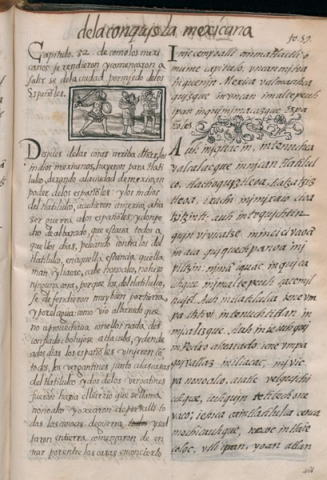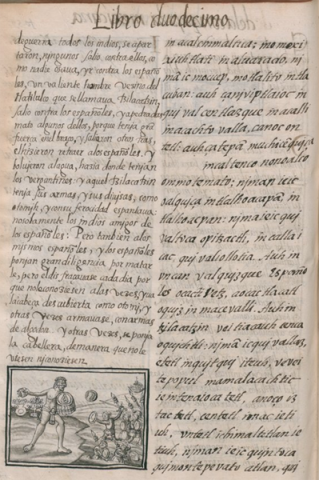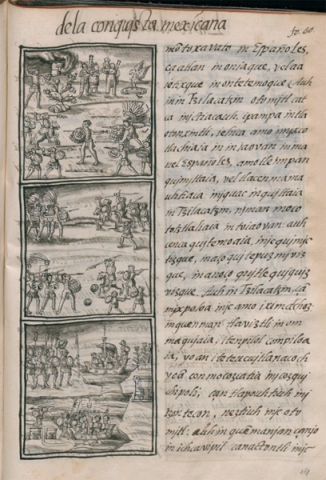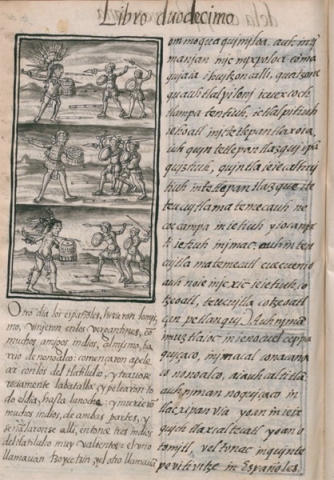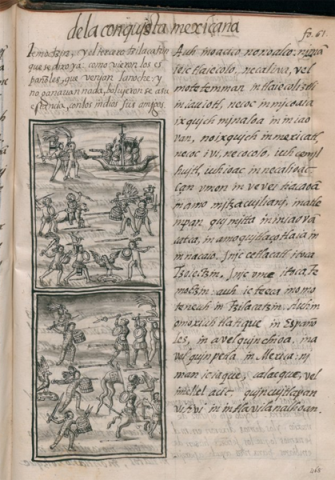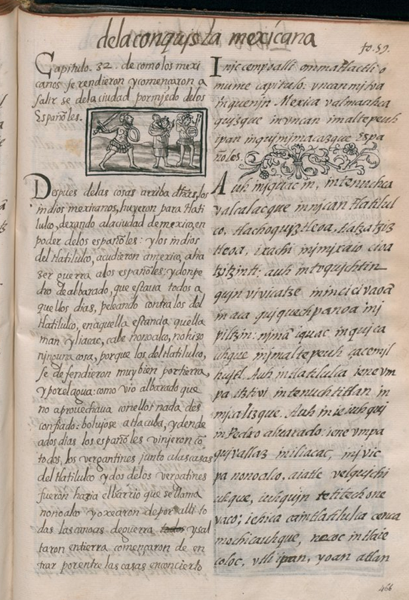 |
[Transcription of the Nahuatl (right-hand column) by James Lockhart:]
[f. 59r.] Inic cempoalli ommatlactli omume capitulo: vncan mitoa in quenin Mexica valmauhcaquizque in vncan imaltepeuh ipan in quimimacazque Españoles.
Auh in iquac in, in tenuchca valcalacque in nican tlatilulco, tlachoquiztleoa, tlatzatziztleoa, ixachi in imixaio cioatzitzinti: auh in toquichtin quinvivicatze in incicivaoā in aca quiquechpanoa in ipiltzin: nimā iquac in quicauhque in imaltepeuh ça cemilhuitl. Auh in tlatilulca ie ne vmpa itztivi in tenuchtitlan in micalizque.
Auh in ie iuhqui in Pedro aluarado: ie ne vmpa quivallaz in iliacac, in ivicpa nonoalco, aiatle vel quichiuhque, iuhquin tetitech onevaco; iehica ca in tlatilulca cenca mochicauhque, necoc in tlaiecoloc, vtli ipan, yoan atlan
|
[Translation of the Nahuatl (right-hand column) by James Lockhart:]
Thirty-second chapter, where it is said how the Mexica left their altepetl in fear and came here when they dreaded the Spaniards.
And at this time the Tenochca came entering into Tlatelolco here, weeping and shouting. Many were the tears of the women; the men came accompanying their women, and some of them carried their children on their shoulders. In just one day they abandoned their altepetl. But the Tlatelolca still went to Tenochtitlan to fight.
And at this point Pedro de Alvarado hurled his forces at Ilyacac, toward Nonoalco, but they could do nothing; it was as though they had hit against a stone, because the Tlatelolca made great efforts. There was fighting on both sides of the road and in the water
[Translation of the Spanish (left-hand column) by James Lockhart:]
Chapter Thirty-two, of how the Mexica gave up and began to leave the city for fear of the Spaniards.
After the things mentioned above, the Mexica Indians fled toward Tlatelolco, leaving the city of Mexico in the hands of the Spaniards, and the Indians of Tlatelolco headed for Mexico to give battle to the Spaniards.
Don Pedro de Alvarado, who was fighting during all these days against the Tlatelolca in the place they call Ilyacac, near Nonoalco, achieved nothing, because the Tlatelolca defended themselves very well on land and on water. When Alvarado saw that he was getting nowhere with them, giving up hope he returned to Tacuba. Two days later the Spaniards came against them with all the brigán tines, next to the houses of Tlatelolco. Two of the brigantines went toward the district called Nonoalco and chased away all the war canoes; they went on land and began to enter among the houses in
|
[Translation of the Nahuatl into Spanish by Fr. Bernardino de Sahagún; transcription of the Spanish (left-hand column) by James Lockhart:]
[f. 59r.] Capitulo .32. de como los mexicanos se rendieron y començaron a salirse de la ciudad por miedo de los Españoles.
[Aquí: un dibujo]
Despues de las cosas arriba đħas, los indios mexicanos, huyeron para Tlatilulco, dexando a la ciudad de mexico, en poder de los españoles: y los indios del tlatilulco, acudieron a mexico, a hazer guerra a los españoles:
y don pedro de albarado, que estaua todos aquellos dias, peleando contra los del tlatilulco, en aquella estancia que llaman yliacac, cabe nonoalco, no hizo ninguna cosa, porque los del tlatilulco, se defendieron muy bien por tierra, y por el agua: como vio albarado que no aprouechaua con ellos nada desconfiado: boluiose a tlacuba, y dende a dos dias los españoles vinieron cō todos los vergantines junto a las casas del tlatilulco y dos de los vergantines fueron hazia el barrio que se llama nonoalco y oxearon de por alli todas las canoas de guerra y saltaron en tierra començaron de entrar por entre las casas en concierto
|
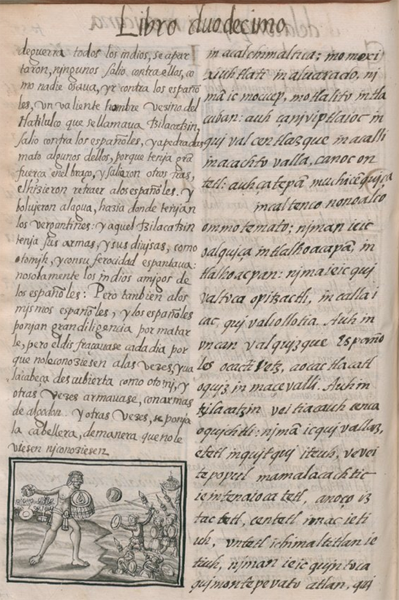 |
[Transcription of the Nahuatl (right-hand column) by James Lockhart:]
[f. 59v.] in acalchimaltica; in omoxixiuhtlati in aluarado, nimā ic mocuep, motlalito in tlacuban: auh çan iviptlaioc in quivalcentlazque in acalli in acachto valla, can oc ontetl: auh çatepā muchi cēquiça in caltenco nonoalco ommotemato: niman ie ic oalquiça in tlalhoacapā, in tlalhoacpan: nima ie ic quivaltoca opitzactli, in calla icac, quivaliollotia.
Auh in vncan valquizque Españoles ocactivetz, aocac tlacatl oquiz in maçevalli. Auh in tzilacatzin vei tia cauh cenca oquichtli: nim ic quivallaz, etetl in quitqui iteuh, vevei tepopul mamalacachtic ie in tenaiocatetl, anoço iztac tetl,* centetl imac ietiuh, vntetl ichimaltitlan ietiuh, niman ie ic quintoca quimontepevato atlan, qui
----------
*IZTAC TETL. Literally "white stone," this phrase would appear to have had some still undiscovered technical meaning.
|
[Translation of the Nahuatl (right-hand column) by James Lockhart:]
with war boats. When Alvarado tired, he returned and established himself in Tlacopan. But just two days later they sent out all the boats; at first only two came, then afterward all of them, and formed beside the houses in Nonoalco. Then they came onto dry land, and then they began to follow the narrow road between the houses; they came toward the center of them.
When the Spaniards landed it fell silent; not one of the people came out. But then Tzilacatzin, who was a great warrior and very valorous, hurled three stones he was carrying, huge round stones, wall stones or white stones; he had one in his hand and two on his shield. Then he went pursuing the Spaniards, scattering them, forcing them into the water.
[Translation of the Spanish (left-hand column) by James Lockhart:]
military formation. The Indians all kept at a distance; no came out against the Spaniards.
Because no one dared to go against them, a brave man, a citizen of Tlatelolco named Tzilacatzin, sallied forth against the Spaniards and by casting stones killed some of them, for he had great strength in his arm. Others came out behind him and made the Spaniards retreat. They returned to the water, toward where they had the brigantines.
This Tzilacatzin had weapons and insignia in the style of an Otomi, and with his ferocity he frightened not only the Indian friends of the Spaniards, but also the Spaniards themselves. The Spaniards went to great lengths trying to kill him, but each day he disguised himself so that they would not know him. Sometimes he went with his head uncovered as an Otomi; other times he donned cotton armor, and other times he put on a hairpiece so that they would not see him or know him.
|
[Translation of the Nahuatl into Spanish by Fr. Bernardino de Sahagún; transcription of the Spanish (left-hand column) by James Lockhart:]
[f. 59v.] de guerra todos los indios, se apartaron, ningunos* salio contra ellos,
como nadie osaua, yr contra los españoles, vn valiente hombre vezino del tlatilulco que se llamaua tzilacatzin, salio contra los españoles, y a pedradas mato algunos dellos, porque tenia grā fuerça en el braço, y salieron otros tras, el hizieron retraer a los españoles. y boluieron al agua, hazia donde tenian los vergantines:
y aquel tzilacatzin tenia sus armas, y sus diuisas, como otomih, y con su ferocidad espantaua: no solamente los indios amigos de los españoles: Pero tanbien a los mismos españoles, y los españoles ponian gran diligencia por matarle, pero el disfraçauase cada dia por que no conoziesen a las vezes, yua la cabeça descubierta como otomi, y otras vezes armauase, con armas de algodon. y otras vezes, se ponia la cabellera, de manera que no le viesen ni conoziesen
----------
*NINGUNOS. The number of the verb demands "ninguno."
|
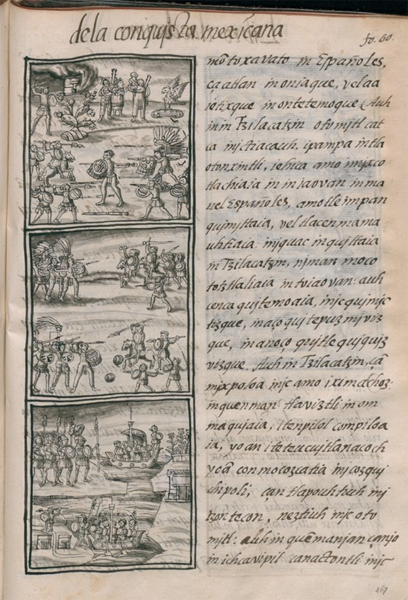 |
[Transcription of the Nahuatl (right-hand column) by James Lockhart:]
[f. 60r.] mō toxavato in Españoles, ça atlan in oniaque, vel aaietixque in ontetemoque
(Auh inin Tzilacatzin otomitl catca inic tiacauh, ipampa in tlaotonxintli, iehica amo imixco tlachiaia in iniaovan in manel Españoles, amo tle impan quimittaia, vel tlacenmamauhtiaia: in iquac in quittaia in Tzilacatzin, niman mocototztlaliaia in toiaovan: auh cenca quitemoaia, inic quimictizque, in aço quitepuzmivizque, in anoço quitlequiquizvizque. Auh in Tzilacatzin, çā mixpoloa inic amo iximachoz: in quenman tlaviztli in ommaquiaia, itenpilol compiloaia, yoan iteteucuitlanacoch yoā conmocozcatia in icozqui chipoli, çan tlapouhtiuh in itzontecon, neztiuh inic otomitl: auh in quē manian çanio in ichcavipil canactontli inic
|
[Translation of the Nahuatl (right-hand column) by James Lockhart:]
They went right into the water; those who went down in the water got thoroughly wetted.
(This Tzilacatzin had the warrior [rank] of Otomi, for which reason he wore the Otomi hairstyle, so he looked down on his enemies, even though they be Spaniards, thinking nothing of them. He inspired general fear. When our enemies saw Tzilacatzin, they would hunch down. They strove greatly to kill him, whether shooting him with iron bolts or with guns. But Tzilacatzin disguised himself in order not to be recognized. Sometimes he would put on [his own] device, with his lip pendant and his golden ear plugs, and he would put on his shell necklace. He would go with his head uncovered, showing that he was an Otomi. But sometimes he put on only cotton upper armor and covered his forehead with a little narrow cloth.
[Translation of the Spanish (left-hand column) by James Lockhart:]
(intentionally blank)
|
[Translation of the Nahuatl into Spanish by Fr. Bernardino de Sahagún; transcription of the Spanish (left-hand column) by James Lockhart:]
[f. 60r., tres dibujos; sin texto en español]
|
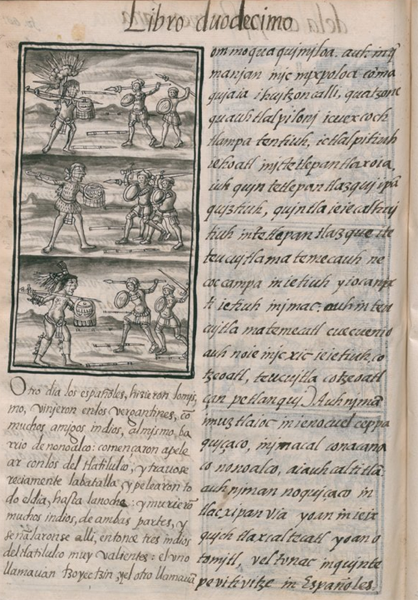 |
[Transcription of the Nahuatl (right-hand column) by James Lockhart:]
[f. 60v.] ommoquaquimiloa, auh in q̄manian inic mixpoloa cōmaquiaia ihuitzoncalli, quatzone quauhtlalpiloni icuexcochtlampa tentiuh, ic tlalpitiuh iehoatl inic tetlepantlaxoia, iuhquin tetlepantlazqui ipā quiztiuh, quintlaieiecalhuitiuh in tetlepantlazque iteteucuitlamatemecauh necoccampa in ietiuh yiocanixti ietiuh in imac: auh in teucuitlamatemecatl cuecuenio auh no ie in icxic ieietiuh, cotzeoatl, teucuitlacotzeoatl çan petlanqui.)
Auh nīma imuztlaioc in ie no cuel ceppa quiçaco in imacal conacanaco nonoalco, aiauhcaltitlā: auh niman no quiçaco in tlacxipanvia yoan in ie ixquich tlaxcaltecatl yoan otomitl, vel tonac in quintepevitivitze in Españoles.
|
[Translation of the Nahuatl (right-hand column) by James Lockhart:]
to disguise himself he put on a feather hairpiece or wig, with eagle feathers tied at the back of the neck. This was the way that those who threw people in the fire were attired; he went about looking like one of them, imitating them. He had golden arm bands on both sides, on both arms, shimmering, and he also had shining golden bands on the calves of his legs.)
Then the next day they came again and grounded their boats at Nonoalco, at Ayauhcaltitlan. Also those who go on foot and all the Tlaxcalans and Otomis came, a great abundance of them. The Spaniards came herding them ahead of them.
[Translation of the Spanish (left-hand column) by James Lockhart:]
The next day the Spaniards did the same thing; they came in the brigantines with many Indian friends to the same district of Nonoalco. They began to fight with the Tlatelolca; the battle was fierce, and they fought all day long until night. Many Indians died on both sides.
Three very valiant Indians of Tlatelolco distinguished themselves there at that time: the one called Tzoyectzin, another called
|
[Translation of the Nahuatl into Spanish by Fr. Bernardino de Sahagún; transcription of the Spanish (left-hand column) by James Lockhart:]
[f. 60v.] Otro dia los españoles, hizieron lo mismo, vinieron en los vergantines, cō muchos amigos indios, al mismo barrio de nonoalco: començaron a pelear con los del tlatilulco, y trauose reciamente la batalla, y pelearon todo el dia, hasta la noche: y murierō muchos indios, de ambas partes,
y señalaronse alli, entonce tres indios del tlatilulco muy valientes: el vno llamauan tzoyectzin, y el otro llamauā
|
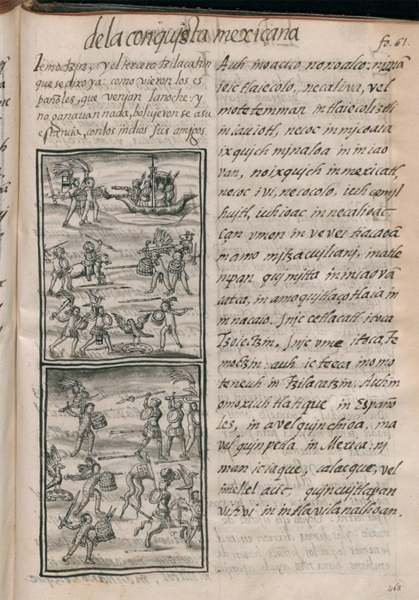 |
[Transcription of the Nahuatl (right-hand column) by James Lockhart:]
[f. 61r.] Auh in oacico nonoalco: nimā ie ic tlaiecolo, necaliva, vel motetemman in tlaiecoliztli in iauiotl, necoc in micoaia ixquich minaloa in iniaovan, no ixquich in mexicatl, necoc ivi, necocolo, iuh cemilhuitl, iuh ioac in necalioac.
Çan vmen in vevei tiacaoā in amo mitzacuiliani, in atle inpan quimitta in iniaovā catca, in amo quitlaçotlaia in innacaio. Inic ce tlacatl itoca Tzoiectzin. Inic vme itoca, Temoctzin: auh ic teeca in omoteneuh in Tzilacatzin.
Auh in omoxiuhtlatique in Españoles, in avel quinchioa, in avel quinpetla in Mexica: niman ic iaque, calacque, vel imellel acic, quincuitlapanvitivi in intlavilanalhoan.
|
[Translation of the Nahuatl (right-hand column) by James Lockhart:]
And when they got to Nonoalco, there was fighting and skirmishing; the scene filled with combat and battle. There were deaths on both sides; equal numbers of the Mexica and their enemies were hit. Thus on both sides there were wounded, and the fighting went on day and night.
There were only two great warriors who did not hide their faces, who thought nothing of their enemies, who did not place value on their bodies. The first was named Tzoyectzin and the second Temoctzin. A third was the already mentioned Tzilacatzin.
When the Spaniards tired, when they were unable to do anything with the Mexica, unable to penetrate them, they went away. They entered [their quarters] in very low spirits, their auxiliaries following after them.
[Translation of the Spanish (left-hand column) by James Lockhart:]
Temoctzin, and the third Tzilacatzin, who was already mentioned. When the Spaniards saw that night was coming and they were gaining nothing, they returned to their base with their Indian friends.
|
[Translation of the Nahuatl into Spanish by Fr. Bernardino de Sahagún; transcription of the Spanish (left-hand column) by James Lockhart:]
[f. 61r.] Temoctzin, y el tercero tzilacatzin que se dixo ya:
como vieron los españoles, que venian la noche: y no ganauan nada, boluieronse a su estancia, con los indios sus amigos.
|
